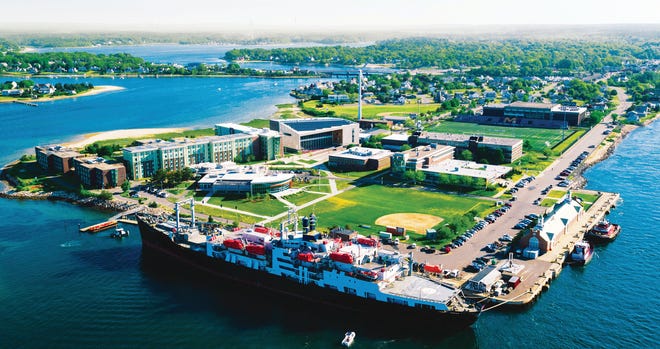Ongoing training at MMA, UMD, BCC for offshore wind jobs

[ad_1]
Rear Admiral Francis X. McDonald
Rear Admiral Francis X. McDonald, USMS, is President of the Massachusetts Maritime Academy.
The US Department of Energy estimates that 43,000 new jobs will be created in the offshore wind market by 2030. The east coast, and in particular the northeast, is poised to benefit from this industry by full growth.
The Massachusetts Clean Energy Center has published an assessment of the jobs and economic impacts associated with the 1,600 megawatt development in Massachusetts. This study estimated that over the next decade, offshore wind farms will create 2,000 to 3,000 jobs and generate economic impacts of $ 1 to $ 2 billion across the region.
Companies are moving forward to make offshore wind a reality as a vital energy source for our region.
Vineyard Wind recently completed the approval and clearance process and is cleared to begin construction of the first large-scale offshore wind farm in the United States – an 800 megawatt project. Mayflower Wind has won the second contract to sell electricity to Commonwealth power distribution companies and is developing a federal offshore concession area that has the potential to generate over 1,600 megawatts of clean energy at low cost or enough for power more than half a million homes.
With the potential for thousands of well-paying jobs to come to the region, we need to have a well-trained and ready-to-go workforce. CONNECT higher education institutions are working together to make sure this happens.
CONNECT4WIND is an innovative partnership between Bristol Community College, Massachusetts Maritime Academy (MMA) and the University of Massachusetts at Dartmouth which formed in June 2018. Through a formal agreement, we share resources and collaborate on the development of offshore wind energy programs and programs. . Bristol, MMA, UMass Dartmouth and other CONNECT partners including Bridgewater State University, Cape Cod Community College and Massasoit Community College are developing training programs and engaging with industry and local stakeholders so that our Students are now prepared for both academic and practical training to fill the jobs that offshore wind and supply chain will create in the near future.
MMA, in partnership with Relyon Nutec and with financial support from the Massachusetts Clean Energy Center, launched the Global Wind Organization’s first basic safety training program in the Northeast. Our curriculum consists of five modules, which we were the first in the country to offer: First Aid, Manual Handling, Fire Awareness, Work at Height and Survival at Sea. In addition, the seven undergraduate programs and the three undergraduate programs. MMA graduate studies have strong ties to co-ops and jobs within the wind industry, which provide hands-on training to students who wish to join this growing workforce. Bristol Community College’s National Offshore Wind Institute (NOWI) will provide the offshore wind industry and its supply chain with a one-stop-shop for training, certifications and customized programs for its workforce. NOWI, together with its globally recognized partner Maersk Training, will provide the Global Wind Organization’s basic safety and basic technical training required for offshore wind workers in the field. Bristol also offers an Associate Degree Program in Offshore Wind Technology as well as a Certificate to Become an Offshore Wind Energy Technician.
Cape Cod Community College, with support received from the Massachusetts Clean Energy Center, launched a Sustainable Energy Certificate, offering an introduction to the offshore wind and renewable energy industries with a focus on emerging technologies, career opportunities and educational paths. CCCC also connects its students to internship and rapidly developing cooperation opportunities in offshore wind. Through community outreach efforts, CCCC offered workshops on offshore wind technologies and careers for middle and high school students and teachers, and the general public in communities in Cape Town and Islands.
Additionally, scientists and engineers at UMass Dartmouth played a key role in the federal approval process for Vineyard Wind as well as other relevant topics, such as foundation design, wind resource forecasting, advanced materials and policy guidance, with more than $ 8 million in research funding. for offshore wind to date. Researchers at UMass Dartmouth will continue to play a key role in monitoring environmental, economic and fishing industry impacts.
Training our workforce locally helps maintain jobs in the region. Who better to keep the offshore wind industry efficient, productive and safe than our local young people who live here and want to see their home countries benefit from a clean source of energy for many years to come?
A dedication to offshore wind training also strengthens Massachusetts’ position as a progressive leader in clean energy. Reducing carbon emissions and reliance on foreign oil will require a strategic increase in offshore wind production capacity. Greater energy independence will also be created when this industry is supported by American businesses and workers – from construction and responsible decommissioning to operations and maintenance.
The development of the offshore wind industry and workforce offers great benefits for our region, our country and our planet. Public higher education institutions in this region are delighted and honored to partner to ensure that we have trained and educated people ready for the critical positions in the offshore wind industry that will power the future. With our established relationships, comprehensive articulation agreements and the collective passion to promote this industry, CONNECT’s collaboration ensures that these results will be achieved.
Rear Admiral Francis X. McDonald, USMS, is the president of the Massachusetts Maritime Academy, one of the nation’s six state maritime academies. Founded in 1891, the Massachusetts Maritime Academy has trained business leaders, ship captains, engineers, and professional officers in the 19th, 20th, and now 21st centuries. Offering seven undergraduate and three graduate programs, Massachusetts Maritime Academy is one of two “special mission†public universities in the Commonwealth of Massachusetts.
[ad_2]
